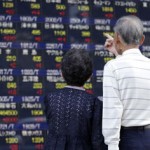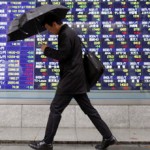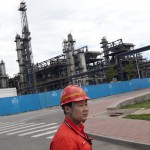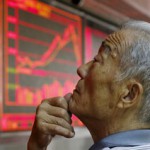Asian stocks fall after tepid China PMI survey
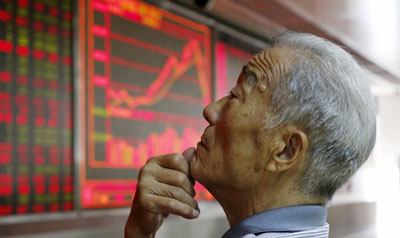
A general view of market boards at the ASX Exchange Centre in Sydney, Australia.
Asian stocks mostly slipped into the red on Monday, as investors digested a private survey which showed China‘s mammoth manufacturing sector remaining in a tough spot, though the pace of decline in factory activity slowed in October.
Caixin’s purchasing managers’ index (PMI) for October edged up to 48.3 from September’s fresh six-and-a-half year low of 47.2, official data showed, contracting for an eighth straight month.
China’s official purchasing managers’ index (PMI) came in at 49.8 for October, according to data released on Sunday by the National Bureau of Statistics (NBS), contracting for a third straight month. The reading was unchanged from the previous month but missed market expectations of 50.0, adding to fears that the world’s second-biggest economy may be stalling despite the latest slew of stimulus.
“Over the weekend, official manufacturing and non-manufacturing PMIs continue to point to challenges in China… but we think that the recent targeted stimulus measures will support the economy.” analysts from Mizuho Bank wrote in a note issued on Monday. “Overall China may expand by 6.9 percent year-on-year this year, then pick-up to 7.1 percent next year.”
China markets lower
Share markets in China turned negative in the afternoon trading session, with the key Shanghai Composite index easing 0.8 percent after returning from the lunch break.
Banking shares which are seen as a proxy on China’s economic growth lagged. Industrial and Commercial Bank of China (ICBC) — the world’s largest bank by assets — slipped 0.4 percent. China Construction Bankdropped by a similar margin, while Agricultural Bank of China and Bank of Communications shed 0.3 percent each.
PetroChina which has the heaviest weighting of any Chinese company in the Shanghai index, sagged 0.8 percent.
Among other indexes, the blue-chip CSI300 index dropped 0.8 percent after recouping losses earlier in the session. The Shenzhen Composite pared all of its gains, while Hong Kong’s Hang Seng index dropped 0.8 percent.
Hong Kong-listed casino operators such as Galaxy Entertainment andSands China bounced up 1.5 and 0.7 percent respectively, while SJM Holdings sagged 0.2 percent, following data over the weekend that showed gambling revenue in Macau fell 28.4 percent in October from the same period a year earlier, marking the 17th consecutive month of decline.
HSBC traded flat after the British lender reported a better than expected 32 percent rise in pretax profit for the third quarter, thanks to reduced costs from regulatory fines.
Taiex gains 0.7%
Taiwan’s weighted index edged up, with the help of Apple supplier shares.
Pegatron Corp. advanced 0.8 percent, while Hon Hai Precision andCatcher Technology nudged up 0.3 percent each. Large-cap Taiwan Semiconductor Manufacturing Co. ticked up 0.3 percent.
Shares of Powertech Technology plunged 1.7 percent, losing steam after an early surge on the back of news from late Friday that China’sTsinghua Unigroup would take a 25 percent stake in the Taiwanese chip tester and packager.
The Taiwanese government on Friday announced a stimulus package to boost domestic consumption, after advance estimate of third-quarter gross domestic product showed Taiwan’s economy contracting 1.01 percent from a year ago, worse than the 0.6 percent decline forecast in a Reuters poll.
The data marked Taiwan’s first year-on-year decline in quarterly GDP since the global financial crisis in 2009.
Nikkei skids 2.1%
Japan’s Nikkei 225 index slid further below the 19,000 mark to touch a one-and-a-half-week trough.
Stocks with heavy exposure to the mainland were on the back foot amid more China-related concerns. Steel producers Nippon Steel and Sumitomo Metal and JFE Holdings tumbled more than 5 percent each, while Nisshin Steel slumped 4 percent. Construction equipment makersKomatsu and Hitachi Construction Machinery Co declined 1.7 and 0.9 percent respectively.
Banking stocks such as Mitsubishi UFJ Financial Group and Sumitomo Mitsui Financial Group were also down more than 3 percent each, while near 3 percent losses in heavyweight components such as Fanuc andFast Retailing took the bourse further south.
Among export-oriented counters, Sharp fell 4.5 percent to record lows after reporting dismal profits and slashing guidance last Friday.
Shipper Kawasaki Kisen Kaisha tanked 8.4 percent, hurt by a dismal earnings report where it cut its full-year operating profit forecast to 24 billion yen from 39 billion yen for the year ending March 2016.
The Bank of Japan (BOJ) refrained from easing monetary policy last Friday, but the Nikkei newspaper reported that the government may introduce additional budget measures if third-quarter GDP, due on November 16, shows the economy struggling.
Kospi adds 0.3%
South Korea’s Kospi index eked out marginal gains early Monday, thanks to gains in the heavyweight components.
Samsung Electronics and Hyundai Motor elevated 0.7 and 0.6 percent respectively, while chipmaker SK Hynix climbed 3.8 percent.
On the domestic data front, South Korea’s September current account surplus touched a three-month high of $9.76 billion on a seasonally adjusted basis, central bank data showed on Monday. Exports fell 0.9 percent to $44.5 billion in September, while imports dropped 7.8 percent to $33.2 billion, the data showed. This produced a goods account surplus of $11.3 billion.
The country also released factory activity data on Monday. The Nikkei/Markit PMI ticked down to a seasonally adjusted 49.1 in October, barely changed from 49.2 in the previous month and chalking up a deteriorating trend for an eighth straight month.
ASX loses 1.4%
Australia’s S&P ASX 200 index slumped to its lowest level since October 14, on course to chalk up its sixth session of losses, as a sell-off unfolded in the financial sector.
Westpac more than doubled losses to 2.2 percent, despite announcing announcing a 3 percent rise in annual cash profit prior to the market open. Australia and New Zealand Banking, National Australia Bank andCommonwealth Bank of Australia declined nearly 2 percent each by mid-morning trade.
Investment bank Macquarie Group widened losses to 4.7 percent on news that it was planning a share purchase plan.
Gold prices at four-week lows in early Asian trade also dented appetite for producers down under. Evolution Mining was the biggest loser, down 3.2 percent, while Kingsgate Consolidated and Newcrest Miningfell 1.5 and 1.1 percent respectively.
Miners turned mixed following the mainland’s PMI data; BHP Billitonslipped 0.4 percent, while Rio Tinto pared losses to tick up marginally above the flatline. Fortescue Metals rallied 2.9 percent.
On the other hand, Santos which remains in the spotlight as investors await the next move from bidders keen on the oil and gas producer’s assets, surged 2.8 percent.
Meanwhile, the Turkish lira hit 2.9146 per dollar on Monday, hitting its strongest since August 17, following news that the ruling AK partysurged to victory in national elections on Sunday.
Wall Street finished weaker last Friday amid a mixed bag of earnings report. The blue-chip Dow Jones Industrial Average and S&P 500closed down 0.5 percent each, while the Nasdaq Composite shed 0.4 percent.
Source: CNBC – Asian stocks fall after tepid China PMI survey









